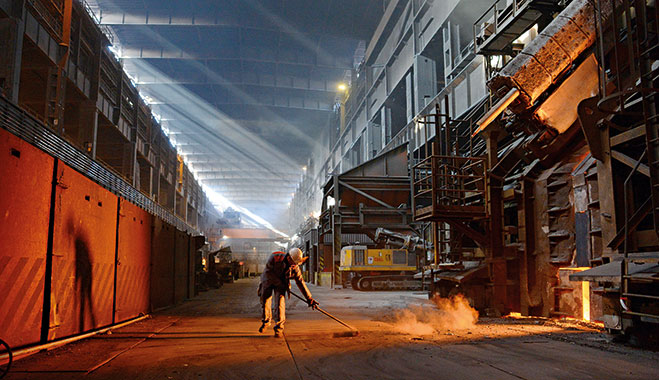
Chinese investment and trade with Africa encompasses many industries and commodities, from oil projects in Angola and Sudan, to cotton from Burkina Faso and fish from Namibia. Recently, however, China has increasingly been investing in iron-ore mines and steel metal works. While Chinese purchase of African mines is nothing new – it has for many years owned and operated Zambian copper mines – the Communist state has made a number of notable acquisitions of late.
One result of the West African Ebola outbreak in 2014, aside from the tragic loss of human life, has been a slowdown of mining operations in the region. In August of that year Mining Review noted that the health crisis had increasingly made it ‘difficult to transport supplies and skills to the mines’. The world’s biggest steelmaker, ArcelorMittal, the industry magazine reported had, “seen disruption to the expansion of its iron ore mine in Liberia due to the Ebola outbreak. Furthermore, the share prices of some mining companies in Sierra Leone, such as London Mining and African Minerals, have slumped on potential disruption of operations there.” By the end of the year, African Minerals had shut down the continent’s second-largest iron-ore mine, in Tonkolili, Sierra Leone.
At every point in the production process of steel, from the mine to sales, it seems, China is acquiring new assets on the
African continent
Industry take-over
The mine was quickly snatched up by the Chinese state owned enterprise Shandong Iron and Steel Group in April this year. Likewise Hebei and Steel Group – also an SOE – is building a massive steelworks in South Africa, while in May 2015 it was granted permission to buy out the Swiss firm Duferco’s African steel processing and sales network. At every point in the production process of steel, from the mine to sales, it seems, China is acquiring new assets on the African continent. The country is by far the world’s largest steel producer and reportedly facing a glut. According to The Guardian in June, steel was “cheaper per tonne than cabbage”. The motive behind such moves, then, raises some questions.
In March, the National People’s Congress’ opening session started with a declaration that the government is doing everything it can to fight pollution. China’s high polluting steel industry has been at the heart of this, with a number of the worst polluting mines shut down. There is speculation then that China could be trying to shift its high polluting metal industry overseas, where pollution is not its problem.
Alternatively, these seemingly counterintuitive acquisitions may be seen as part of a strategy to solidify China’s reputation in Africa. Due to the country’s supposed newcomer status, China is using a “stick-at-it-strategy”, according to Henry Tugendhat from the Institute of Development Studies. “They hope that good behaviour during a crisis – even if it loses them money in the short run will secure them better contracts in the future”, wrote The Economist. “The better the mine, the fewer impurities in the ore, and the cheaper it is to turn it into high-grade metal.”
The next step
This seems unlikely. China has had a longstanding partnership with many African countries. The famous 1955 Bandung Conference, where 29 countries met to try and foster Afro-Asian relations and to oppose colonialism, China committed itself to fostering economic relations with African states, leading to 50,000 Chinese workers helping to construct the Tanzam railroad that linked the port of Dar es Salaam in Tanzania with Zambia.
Economic cooperation accelerated after China’s gradual embrace of market reforms. In the 1980s total trade between the country and the continent was worth $1bn a year. This increased sixth fold by the 1990s, and by 2012 reached $163.9bn. By 2014, ODI from China to Africa totalled $130bn. At the same time, on average Africans have the highest positive view of China, according to polling by the Pew Research Centre in 2014. China, it would seem, does not need to curry favour by investing in currently unprofitable mines. Chinese intentions aside, these acquisitions will provide much needed jobs and investment for the continent.


